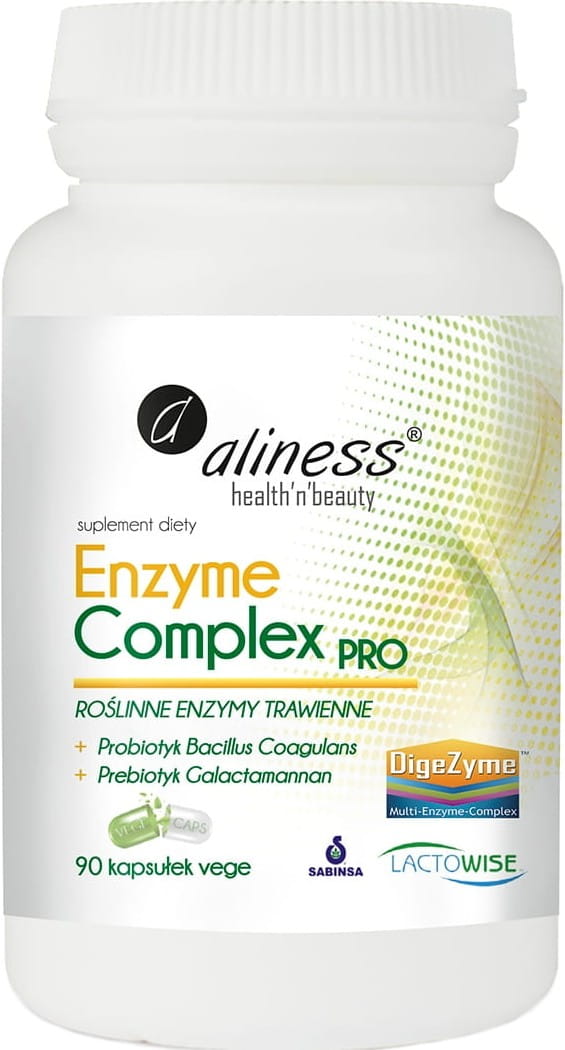Vegetable digestive enzyme complex per 90 ALINESS vegetarian capsules
- Regular price
- €15,22
- Regular price
-
- Sale price
- €15,22
- Unit price
- per
Couldn't load pickup availability
Description
xDESCRIPTION
- vegetable enzymes
- support digestion
- a good source of soluble fiber
- contains a synbiotic
DigeZyme® is an innovative, multi-enzymatic DigeZyme® complex. It consists of non-GMO broad spectrum enzymes including amylase, protease and lipase obtained during fermentation of Aspergillus oryze. These enzymes break down carbohydrates, proteins and fats, and all three are enteric while maintaining their digestive activity.
LactoWise® is a probiotic-prebiotic complex called a synbiotic. The bacteria Bacillus coagulans vieble spore it contains can be stored at room temperature. Glactomannan is a prebiotic fiber. It is a soluble fiber fraction obtained from dietary fiber, fenugreek seeds.
Digestive enzymes are a group of enzymes secreted in the digestive system, mainly hydrolases (hydrolytic enzymes) that catalyze the breakdown of more complex to simpler (water-based) compounds. In all heterotrophs (heterotrophic organisms), the digestive processes are similar and involve the same or very similar groups of enzymes. Enzymes are involved in almost every process in our body.
The three basic nutrients in food, i.e. carbohydrates, proteins and fats, are only absorbed by the human body after they have been broken down into smaller, digestible molecules. Digestion begins in the mouth, where salivary amylases and saliva begin to break down complex sugars, such as plant starch, into smaller molecules. Food then travels to the stomach, where it is enzymatically processed by a protein-digesting enzyme called pepsin, which is secreted by specialized cells in the stomach called chief cells. Then the stomach contents are transported to the small intestine thanks to the peristaltic movements of the gastrointestinal tract. There, pancreatic juice and bile, which are secreted by the liver via the gallbladder, facilitate further digestion of sugars, proteins and - most importantly - dietary fats. The corresponding enzymes, ie pancreatic amylase, carboxypeptidase and lipases, are supplied with pancreatic juice. Pancreatic lipase hydrolyzes fats into free fatty acids, which, under the influence of bile salts, convert into micelles, ie a form of dietary fat that is absorbed by the cells of the digestive tract.
INGREDIENTS
Digezyme® Complex including: Alpha-Amylase (from Aspergillus oryzae), Neutral Protease (from Bacillus licheniformis), Lactase (from Aspergillus oryzae), Lipase (from Aspergillus oryzae), Cellulase (from Trichoderma reesei), Fibregum™ - Fibrous Acacia (prebiotic ), LactoWise®: (Bacillus coagulans vieble spore MTCC 5856) (probiotic), glactomannan (prebiotic)), capsule shell (hydroxypropylmethylcellulose).
Amount per daily dose:
Digezyme® complex, including: 150 mg
Alpha Amylase ( Aspergillus oryzae ) - 3600 U
Neutral Protease ( Bacillus licheniformis) - 900 U
Cellulase ( Trichoderma reesei) - 30 U
Lactase ( Asper Gillus oryzae) - 600 U
Lipase ( Aspergillus oryzae) - 150 U
Fibregum ™ (acacia fiber - prebiotic) - 100 U
LactoWise® complex with: 10 mg
Probiotic (Bacillus coagulans MTCC 5856) – 0.15 billion
Prebiotic (galactomannan) – 3.5 mg
* RWS - reference intake value
Source of Digezyme® enzymes:
Alpha-amylase (Aspergillus oryzae) - from fungi
Lactase (Aspergillus oryzae) - from fungi
Lipase (Aspergillus oryzae) – from fungi
Cellulase (Trichoderma reesei) – from fungi
Neutral Protease (Bacillus licheniformis) - Bacteria
INSTRUCTIONS FOR USE
Consume 1 capsule daily.
Do not exceed the recommended daily dose. The product cannot be used as a substitute for a varied diet. A balanced diet and a healthy lifestyle are the basis for the proper functioning of the body.
RECOMMENDED STORAGE CONDITIONS
Store at room temperature in a dry and cool place. Keep out of reach of small children.
similar products
- Regular price
- €15,22
- Regular price
-
- Sale price
- €15,22
- Unit price
- per
- Regular price
- €15,22
- Regular price
-
- Sale price
- €15,22
- Unit price
- per
- Regular price
- €15,22
- Regular price
-
- Sale price
- €15,22
- Unit price
- per
- Regular price
- €15,22
- Regular price
-
- Sale price
- €15,22
- Unit price
- per
- Regular price
- €15,22
- Regular price
-
- Sale price
- €15,22
- Unit price
- per
- Regular price
- €15,22
- Regular price
-
- Sale price
- €15,22
- Unit price
- per
- Regular price
- €15,22
- Regular price
-
- Sale price
- €15,22
- Unit price
- per
- Regular price
- €15,22
- Regular price
-
- Sale price
- €15,22
- Unit price
- per
- Regular price
- €15,22
- Regular price
-
- Sale price
- €15,22
- Unit price
- per
- Regular price
- €15,22
- Regular price
-
- Sale price
- €15,22
- Unit price
- per
Recently Viewed Products
- Regular price
- €15,22
- Regular price
-
- Sale price
- €15,22
- Unit price
- per
- Regular price
- €15,22
- Regular price
-
- Sale price
- €15,22
- Unit price
- per
- Regular price
- €15,22
- Regular price
-
- Sale price
- €15,22
- Unit price
- per
- Regular price
- €15,22
- Regular price
-
- Sale price
- €15,22
- Unit price
- per
- Regular price
- €15,22
- Regular price
-
- Sale price
- €15,22
- Unit price
- per
- Regular price
- €15,22
- Regular price
-
- Sale price
- €15,22
- Unit price
- per
- Regular price
- €15,22
- Regular price
-
- Sale price
- €15,22
- Unit price
- per
- Regular price
- €15,22
- Regular price
-
- Sale price
- €15,22
- Unit price
- per
- Regular price
- €15,22
- Regular price
-
- Sale price
- €15,22
- Unit price
- per
- Regular price
- €15,22
- Regular price
-
- Sale price
- €15,22
- Unit price
- per
- Choosing a selection results in a full page refresh.











